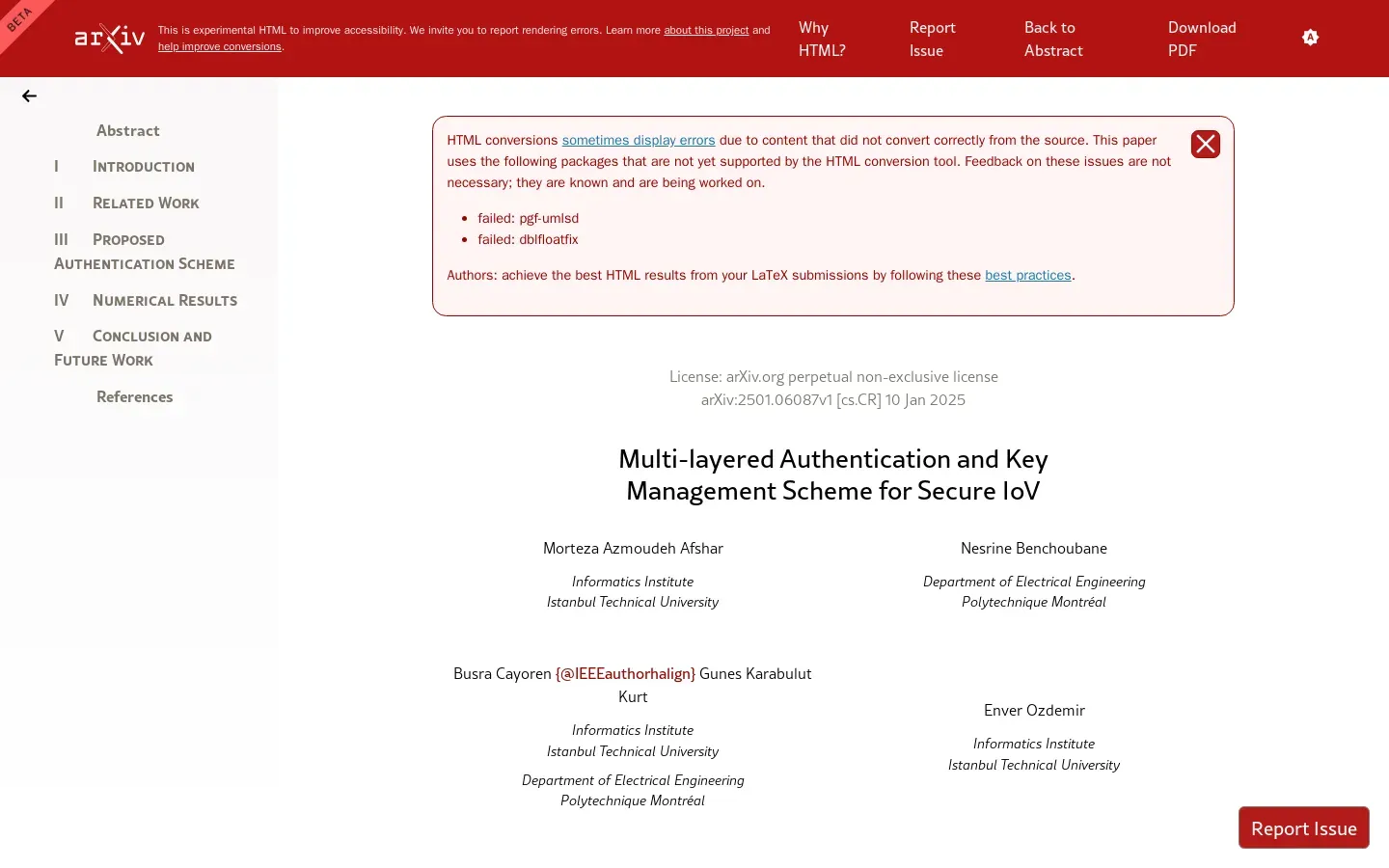
Research on Authentication and Key Management in Connected Vehicles
/ 4 min read
Quick take - A recent study has developed a decentralized authentication framework aimed at enhancing the security, privacy, and scalability of Vehicular Ad Hoc Networks (VANETs), utilizing blockchain solutions and lightweight protocols to address challenges in high-mobility environments.
Fast Facts
- The study focuses on enhancing security and efficiency in Vehicular Ad Hoc Networks (VANETs) through robust authentication schemes for the Internet of Vehicles (IoV).
- Key methodologies include mutual authentication, identity-based privacy-preserving schemes, and lightweight protocols, with a systematic approach integrating blockchain for decentralized authentication.
- Findings highlight the effectiveness of conditional privacy-preserving authentication, lightweight protocols, and batch verification techniques to improve scalability and performance in resource-constrained environments.
- The research advocates for decentralized authentication methods, emphasizing their potential to transform cybersecurity practices in dynamic, high-density vehicular settings.
- Future directions include exploring privacy preservation techniques and addressing scalability challenges as the number of connected vehicles increases.
As the world hurtles towards an era where vehicles communicate with each other and their surroundings, the importance of cybersecurity in vehicular networks cannot be overstated. The rise of the Internet of Vehicles (IoV) marks a significant shift in how we perceive transportation; it offers immense potential for improving safety, efficiency, and convenience. Yet, with this evolution comes an array of cybersecurity challenges that demand innovative solutions. Recent research focused on conditional privacy-preserving authentication schemes for Vehicular Ad-hoc Networks (VANETs) sheds light on these challenges while proposing robust methods to secure vehicular communications.
At the core of this research is the recognition that adaptive privacy mechanisms based on contextual awareness are vital. These mechanisms not only protect user identities but also ensure that vehicles can communicate securely without exposing sensitive information unnecessarily. This balance between privacy and functionality is crucial, particularly as vehicles become more integrated into smart city infrastructures, where data sharing will play a pivotal role in enhancing urban mobility.
Another key focus area is the collaboration with autonomous vehicles, which necessitates advanced security measures. As self-driving cars navigate complex environments, the need for secure communication channels becomes paramount. The research advocates for mutual authentication and key establishment protocols that empower vehicles to confirm each other’s identities before exchanging critical information. This ensures that only trusted entities participate in vehicular communication, reducing the risk of malicious attacks.
In achieving these objectives, the research employs a systematic methodology that includes performance evaluation and scalability testing. These steps are essential to developing lightweight authentication protocols suited for resource-constrained environments typical of many vehicles today. Efficient schemes must strike a careful balance between security requirements and computational efficiency, especially in high-mobility scenarios where delays could have dire consequences.
One of the standout findings from this research is its emphasis on blockchain-based solutions for decentralized authentication. By leveraging blockchain technology, the proposed schemes can mitigate single points of failure, enhancing resilience against emerging threats. This decentralization not only boosts security but also paves the way for greater scalability within VANETs, allowing multiple messages to be verified simultaneously through techniques like batch verification.
As we look at the implications of these findings, they highlight a forward-thinking approach to cybersecurity in rapidly evolving vehicular networks. The development of identity-based conditional privacy-preserving authentication schemes stands to revolutionize how vehicles communicate by ensuring that both efficiency and security coexist seamlessly. Furthermore, integrating these technologies within smart city frameworks promises to bolster overall urban safety and operational effectiveness.
Yet, as promising as these advancements are, some limitations remain. Efficiency concerns linger regarding large-scale deployments where maintaining robust security without compromising speed is challenging. Investigating further into scalable solutions will be crucial as cities worldwide adopt more connected vehicles and infrastructure.
In summary, the current research underlines a crucial paradigm shift towards decentralized, scalable, and efficient authentication methods in vehicular networks. It highlights the necessity for continued innovation in securing our transportation systems while protecting user privacy amidst increasing interconnectivity. As we advance into this future filled with opportunities and challenges alike, it becomes clear that safeguarding our roads will require not just technological advancements but also a collective commitment to prioritize cybersecurity in every layer of vehicular communication infrastructure.



